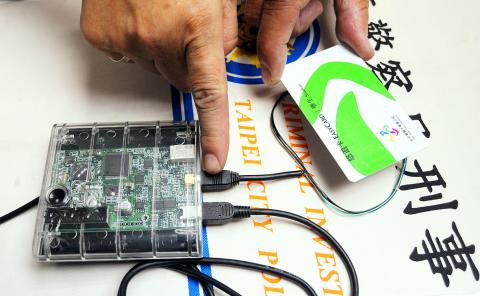A 24-year-old engineer was arrested on Friday on suspicion of cracking the EasyCard encryption system and changing the value of cards to make purchases at convenience stores, Taipei EasyCard Corp said yesterday, maintaining that its security system remains sound.
Wu Dong-lin (吳東霖) allegedly decoded the encryption of three EasyCards he had in his possession and changed the value in each of the cards to NT$9,000. The company’s information security system detected the anomaly and the company worked with police in Taipei to apprehend him after he made a purchase with an EasyCard at a convenience store.
EasyCard general manager Cheng You-chin (鄭有欽) said the company reported the situation to the police immediately after its system detected the anomaly on Sept. 10, but did not lock out the cards so that the police could trace the suspect’s location.

Photo: Lo Pei-der, Taipei Times
Before the arrest was made, the suspect allegedly made six purchases totaling NT$608 using two of the three EasyCards at convenience stores, and the loss to the company was only NT$39 after deducting the original values in the cards of NT$569, Cheng told a press conference held at the company.
Chen Kuo-wen (陳國文), a division chief at the police department, said Wu claimed he only decoded the encryption code for his EasyCards and did not collude with others.
Cheng dismissed concerns about the information security of the EasyCard system, adding that while the encryption system on the cards could be cracked, the company’s transaction security mechanism and other protection systems would serve as the gatekeeper against any acts of theft.
“The suspect did not hack into the value store-up system or copy other users’ EasyCards. We remain confident about our information security mechanisms and we can promise that all customers’ rights will be protected,” he said.
Wu’s alleged crime violated the Act on Issuance and Management of Electronic Monetary Cards (電子票證發行管理條例) and he could face a sentence of one to 10 years, or a fine of up to NT$200 million (US$6.5 million), Chen said.
EasyCards, which are used mostly for public transportation, can be used to make a purchase of up to NT$1,000 per transaction with a daily cap of NT$3,000 after the Financial Supervisory Commission approved their use as an electronic cash card beginning in April last year.
EasyCard holders can store up to NT$10,000 in value and use the card as an electronic wallet at major convenience stores and more than 10,000 shops nationwide.

Alain Robert, known as the "French Spider-Man," praised Alex Honnold as exceptionally well-prepared after the US climber completed a free solo ascent of Taipei 101 yesterday. Robert said Honnold's ascent of the 508m-tall skyscraper in just more than one-and-a-half hours without using safety ropes or equipment was a remarkable achievement. "This is my life," he said in an interview conducted in French, adding that he liked the feeling of being "on the edge of danger." The 63-year-old Frenchman climbed Taipei 101 using ropes in December 2004, taking about four hours to reach the top. On a one-to-10 scale of difficulty, Robert said Taipei 101

A preclearance service to facilitate entry for people traveling to select airports in Japan would be available from Thursday next week to Feb. 25 at Taiwan Taoyuan International Airport, Taoyuan International Airport Corp (TIAC) said on Tuesday. The service was first made available to Taiwanese travelers throughout the winter vacation of 2024 and during the Lunar New Year holiday. In addition to flights to the Japanese cities of Hakodate, Asahikawa, Akita, Sendai, Niigata, Okayama, Takamatsu, Kumamoto and Kagoshima, the service would be available to travelers to Kobe and Oita. The service can be accessed by passengers of 15 flight routes operated by

Taiwanese and US defense groups are collaborating to introduce deployable, semi-autonomous manufacturing systems for drones and components in a boost to the nation’s supply chain resilience. Taiwan’s G-Tech Optroelectronics Corp subsidiary GTOC and the US’ Aerkomm Inc on Friday announced an agreement with fellow US-based Firestorm Lab to adopt the latter’s xCell, a technology featuring 3D printers fitted in 6.1m container units. The systems enable aerial platforms and parts to be produced in high volumes from dispersed nodes capable of rapid redeployment, to minimize the risk of enemy strikes and to meet field requirements, they said. Firestorm chief technology officer Ian Muceus said

MORE FALL: An investigation into one of Xi’s key cronies, part of a broader ‘anti-corruption’ drive, indicates that he might have a deep distrust in the military, an expert said China’s latest military purge underscores systemic risks in its shift from collective leadership to sole rule under Chinese President Xi Jinping (習近平), and could disrupt its chain of command and military capabilities, a national security official said yesterday. If decisionmaking within the Chinese Communist Party has become “irrational” under one-man rule, the Taiwan Strait and the regional situation must be approached with extreme caution, given unforeseen risks, they added. The anonymous official made the remarks as China’s Central Military Commission Vice Chairman Zhang Youxia (張又俠) and Joint Staff Department Chief of Staff Liu Zhenli (劉振立) were reportedly being investigated for suspected “serious